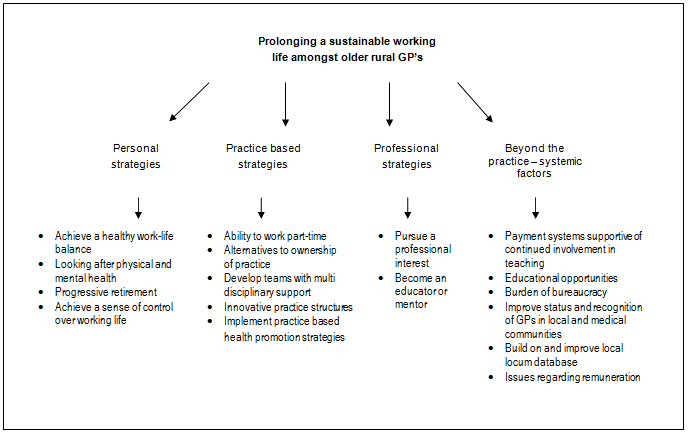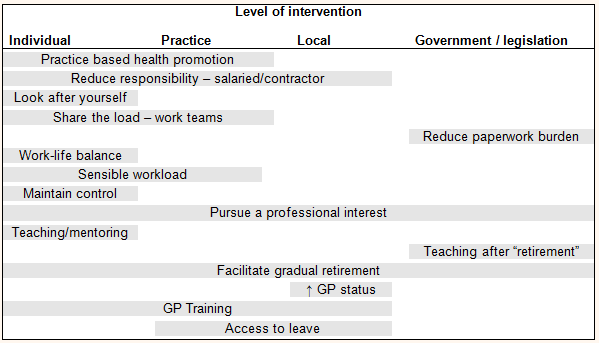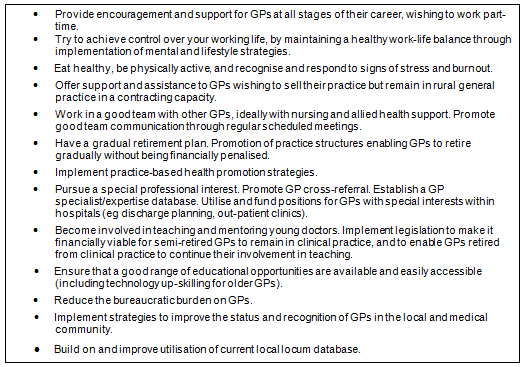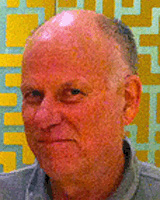full article:
General practitioners play a crucial role in the health of rural communities. However, during recent decades, Australia has witnessed a mounting crisis in the supply and retention of primary-care practitioners in regional and rural areas, amplifying the issues of access to basic medical care for people residing outside major metropolitan or inner regional areas1. This trend is marked by a substantial discrepancy in the supply of GPs among metropolitan, regional and rural areas. In fact, in New South Wales (NSW), the proportion of fulltime equivalent (FTE) GPs per 100 000 population servicing outer regional areas is approximately 40% less than for major city areas1.
The proportion of vocationally registered primary-care practitioners older than 55 years has increased in outer regional areas from 22.2% in 2001 to 36.5% in 2009. This represents the geographical remoteness area with the highest proportion of GPs over 55 years2,3. The significance of this trend is compounded by previously documented earlier retirement among rural GPs4 with the implication that GP workforce shortages will have a greater and earlier impact in rural areas. While traditionally GPs generally retire late, it is anticipated that this will change in the future due to different expectations, attitudes and work patterns among the younger generations of GPs5,6. Brett et al found that approximately one-third of Australian rural GPs plan to retire before the usual retirement age of 65 years7, with intention to leave being a good predictor of actually leaving8. It is also known that the number of medical graduates will double in the next decade9, requiring GP supervisors to teach the incoming new generations of GPs.
Previous Australian surveys have reported substantial sources of dissatisfaction and burnout in GPs working in rural areas. The reasons given have included workload, professional isolation, poor access to leave, and family and lifestyle factors such as spouse employment and schooling for children5,10-12. Similarly, both Humphreys et al13 and Hays et al14 found that the decision to remain in rural general practice was heavily influenced by access to leave and good on-call arrangements. Higher on-call workload and difficulties associated with unpredictable hours, not surprisingly, were associated with smaller rural communities12,15.
In an attempt to meet the healthcare needs of rural communities, the hours worked by GPs increase progressively with decreasing community size15. In 2002, GPs in major cities worked on average 5 hours less per week than those in outer regional areas and over 9 hours less than GPs in remote areas5. It is known from overseas studies that exhaustion and burnout is high among GPs16-18 and recent Australian studies found burnout to be one of the main contributors to early retirement intentions7 and significantly linked to job change intentions17,18. With perceived overload already well documented as one of the most potent predictors of burnout19, the workload discrepancies between rural and non-rural areas may therefore contribute to higher burnout rates, reduced job satisfaction and ultimately earlier exit from rural general practice. Indeed, a Victorian study revealed that up to half of GP workforce attrition in rural Victoria was due to relocation to urban or overseas areas20, and Thommasen et al18 found that half of Canadian rural GPs in their study considered relocation.
In order to develop strategies which may ultimately encourage rural GPs to stay, and make rural general practice an attractive and viable career, it is important to identify the key factors in influencing GPs' decisions to stay. As Hays et al alluded to in their follow-up study of rural GPs remaining in rural practice14, there appears to be a complex interplay between reasons for staying, such as clinical variety21 and community commitment22, and reasons for leaving, such as burnout18 and low job satisfaction23,24. For instance, while employment-related factors such as high workload and perceived inadequate remuneration and recognition have been listed as important factors in reducing job satisfaction among GPs overall25, these same aspects do not appear to have the potential to increase job satisfaction. To learn how to capitalise on facilitating factors, while reducing the impact of inhibiting factors, it is necessary to consult with rural GPs to gain a better understanding of the interaction between these, and gain their insights into perceived solutions.
Previous studies in this area have mostly applied a quantitative methodology, with conclusions therefore being limited by questionnaire design. Hence, the study reported in this article aims at addressing this research gap by exploring, using a qualitative methodology, the most important retention factors which are amenable to intervention at either the personal, practice, local or legislative level.
Subjects and recruitment
Subjects in the study were rural GPs, who were practising in the Northern Rivers region of NSW, Australia. This study formed part of a larger mixed methods study, and a manuscript based on the results from the quantitative survey component currently under preparation. As this was a relatively unexplored area of enquiry, a qualitative methodology was used for this part of the study.
Participants were members of the Northern Rivers General Practice Network (NRGPN), aged over 45 years, and involved in any GP-related work. The NRGPN is the local body representing GPs in that region. Eligible participants received a study package from NRGPN containing a covering letter from the NRGPN, a participant information sheet, the anonymous survey (results from the survey component will be reported elsewhere). They also received a consent form for the interview component, and a reply-paid envelope. All eligible participants received two reminders 2 and 4 weeks after the initial invitation. GPs who returned a completed consent form for participation in the interview component were contacted to arrange a time and venue for the interview. Consenting GPs who were unable to participate in a face-to-face interview were interviewed by phone (n=1).
Data collection
The semi-structured interview schedule was developed to facilitate discussion and reflection around the overall aims of the qualitative study component. Specifically, questions were asked to explore GPs' perceptions of the factors which hinder and encourage healthy workforce participation, reasons for choosing to work or not until and beyond traditional retirement age, and to explore current retirement pathways among GPs. Prompts were used to direct focus to gathering potential solutions to the issues raised (ie 'How do you think that could that be done in practical terms?' 'Which organisation would be most suitable to help you achieve this?' 'What could you personally do to improve this?').
The interviews were conducted mainly by one of the authors (SP), while two were conducted by an occupational health physician (PH) who had previously worked as a rural GP. Interviews lasted approximately 60 min. Demographic information was collected verbally from participants.
Analyses
All interviews were audiotaped and transcribed verbatim. A computer program (NVIVO 9) was used to assist with the organisational aspects of data analysis. All interviews were coded by one of the authors (VH) with identified emergent themes discussed with another author (SP) to achieve consensus. Analysis was performed using a standardised qualitative methodology described by Miles and Huberman26. This article reports the thematic analysis, and enablers and barriers to staying in rural general practice, and solutions offered by GPs across all themes identified.
Ethics approval
The University of Sydney Human Research Ethics Committee approved the study (#14112).
Of the 16 GPs participating, 11 (69%) were male. Of the 14 GPs for whom age was known, the average age was 58 years (median=55.5 years). Two were in solo practice.
The thematic analysis revealed a range of strategies which GPs used or perceived as useful in enabling a happy and productive working life beyond traditional retirement age. These strategies fell into four overarching themes (personal- and practice-based, professional, systemic) containing a number of sub-themes representing the experiences, initiatives or conditions which were felt to be facilitative of a long and sustainable working life in rural general practice (Fig1).

Figure 1: Factors identified (themes and sub-themes) as important in prolonging the working life of rural GPs.
Personal and practice based strategies
Ability to work part-time: One of the strongest themes related to the establishment of a healthy work-life balance through a sustainable work-load. There was a prevailing sense among GPs that the only viable way of staying in the rural GP workforce long-term is working part-time and ensuring that a work-life balance is in place from early career. Several mentioned the difficulties associated with cutting down on hours later in their career, due to the then very established patient expectations. As one GP said:
I think no GP should work full-time, ideally. I think all general practice should be a part-time occupation.
Achieve a healthy work-life balance: Additionally, most GPs mentioned the importance of non-work interests in keeping them 'fresh' at work. Some made successful use of various behavioural and cognitive aids in establishing a strong division between work and their private life:
So I get in my car, and then there's this mental checklist: have I forgotten anything? Are there any things that I'm really concerned about? What do I need to do? Can they wait till tomorrow? Do I need to do them now? Do I need to turn around and go back because I haven't finished? And that's all done within about 5 minutes, and driving takes 20 minutes...and then as I'm going down, I relate it to the drive back, places, and then I start thinking about taking off being a doctor, and now I'm becoming a person again.
Others advised of the necessity to live in a location physically removed from their place of practice in order to maintain their privacy and anonymity.
Looking after physical and mental health: Looking after one's physical and mental health was also perceived as an important avenue for improving 'longevity' among GPs. Approximately half of the GPs interviewed declared that they were 'practising what they were preaching', and felt that their attention to preventive measures were paramount in keeping them healthy and in the workforce. Being physically active and eating well were consistently mentioned as resulting in higher energy levels, while being attentive to one's mental limits (one GP referred to this as 'pressure valve training') was perceived as paramount in preventing burnout.
Achieve a sense of control over working life: Having control over how one practices seems to be an integral component of job satisfaction for GPs. In this sample of GPs, this related mainly to being able to decide on patient load (patients/hours), and work hours. However, few appeared to have been able to achieve this within their current work. As one GP mentioned:
I have a swimming pool so I can take my bad back to the swimming pool and swim it up and down the pool every day...you can be in control of your life, and you can actually have a proper life. So if you could do that, I'd work till I'm 80, I'm sure, till my brain falls off.
Progressive retirement: Having a gradual retirement plan through progressive reduction in hours was perceived by most GPs as a more viable option than sudden and complete retirement from the workforce, from both the rural communities' as well as GPs' perspectives. Many GPs talked of the difficulties faced by most GPs who retired abruptly. Loss of 'identify' and fulfilment were some such difficulties, leading to frequent (but only temporary) return to the workforce once the 'retirement honeymoon' was over. As one GP who was on the path of progressive retirement mentioned:
We can wind that back, we can wind back to four days, three days, two days, and really enjoy the work that we do, and keep going whilst we've got some neuronal activity still happening.
Alternatives to ownership of practice: In a similar way, a very viable 'alternative to retirement' following burnout for some GPs had been to leave their roles as practice principals or associates and work as a salaried GP or contractor. This had also provided a successful way for some to avoid premature retirement, with the benefits mainly described in terms of experiencing reduced guilt associated with limiting one's responsibility.
...whereas if you're working on contract, you go in and do your work, and walk out the door and...forget about it.
Develop teams with multidisciplinary support: An issue raised by many GPs as an important contributor to their longevity in the GP workforce included multi-disciplinary support, work teams, in-practice communication, and being able to share the load; the latter relating particularly to on-call responsibilities. As one doctor said:
I like to have my diabetes educator and psychologist nearby, that I can call upon to assist me manage people in the best way possible, so I think the working in teams is actually good for our patients and it's good for our professional lives, because it's not quite so lonely; you're part of a team and you feel less lonely. I think we've always had our specialist colleagues, but I think in more recent times we're working much more closely with allied health colleagues, and in particular, practice nurses. I think again, they're doing more and more. That doesn't mean we're doing less and less, it just means we're sharing this work load, and probably as a result of that, working more efficiently...
Similarly, it was seen as important to have good, open and regular team and practice communication (such as promoted via scheduled team meetings), and ideally being part of team that consisted not only of other GPs and practice nurses, but also allied health professionals, and good specialist support.
Innovative practice structures for gradually retiring GPs: Many GPs expressed a need for the establishment of practice structures which can allow for the 'gradually retiring' GP to continue working without being financially penalised. One GP outlined the way this was achieved at his practice using a novel associate agreement:
We changed our structure recently a couple of years ago where we all pay a portion of our gross income, around 40%...so the people who are earning less money don't have to pay as much in practice costs.
Some GPs expressed their concern that they themselves or colleagues they knew of were feeling 'forced' to retire fully from the workforce despite still finding enjoyment in their clinical work, due to not having a financially viable option for reducing their work days. One GP suggested that the local GP representative body (Medicare Local) would be ideally placed to facilitate and promote solutions to this at the local level.
Implement practice-based health promotion strategies: Only two GPs in this study currently worked or had worked in practices where organisational (practice-based) health promotion strategies had been in place. However, in both cases the GPs were very positive about the impact these strategies had on staff, both in terms of job satisfaction, and engagement in healthy behaviours. Strategies ranged from flexibility in working hours to accommodate participation in physical activity, to installing a shower to encourage staff to ride or jog to work, or exercise in their lunch break.
Professional strategies
Pursue a professional interest: Apart from being able to work in a team environment, and having a sensible workload, being able to fulfil one's needs for variety or specialised professional interests seemed to be the most important factor in prolonging GPs healthy working lives. For instance, for some this need was met by taking up procedural work in skin cancer clinics.
I'm seeing it with my age group, that doing a bit of general practice and some other speciality area, whether it's teaching or skin medicine or women's health or just something that's a little bit different seems to be quite a key to sustainability.
However, many mentioned wishing for GP specialising to be made easier and promoted more actively. Suggestions included the introduction of GPs as discharge planners at local hospitals, promotion of cross-referral between 'GP specialists', and practice structures wherein specialising GPs wishing to work reduced hours could do so. It was perceived not only as a way to provide stimulation, but also to potentially help increase the status of GPs by giving them an expert status.
Become an educator or mentor: Some GPs alluded to the intrinsic benefits involved in teaching and mentoring, and felt that this 'passing-on of knowledge' kept them 'alive'. However, others expressed a wish for these activities to be better remunerated. As one GP, who was involved in teaching, articulated:
The other thing that's important at our age is to recognize that we don't have to be the best. When we're young, we often think we have to be the best gynaecologist or orthopod in the world. At this stage, we realize we aren't, and we're silly to want to be that. But what we can be is a very good mentor for the young ones. And so if we take a role in teaching medical students, registrars, whatever...it's so gratifying.
Beyond the practice - systemic factors
Payment systems supportive of continued involvement in teaching: Most GPs expressed a wish to keep teaching after retirement from their clinical role, and emphasised the important role of older GP teachers. Most emphasised the need for and importance of legislation to enable 'teaching registration' for retired GPs. Similarly, the introduction of pro-rata registration and insurance for semi-retired GPs was felt to be urgently needed.
I think I suppose there needs to be a little bit of a change in attitude...you don't get to 65 and necessarily retire; there's other pathways, and I think again that the powers that be need to be respectful of the fact that people might want to slow down in steps.
Educational opportunities: Most GPs agreed that further training and development opportunities need to be easily accessible to make GPs remain confident and happy in their work. Training for technology up-skilling appeared to be particularly important for older GPs.
As we get older we still need to do the CPD [continuing professional development] and the updates and all of those kind of things, and possibly even more just to feel confident that we're staying in the ballpark, and that can be a little more difficult in a rural area.
It was felt that access to educational opportunities was quite poor in rural and regional areas. A few expressed a wish for financial support to attend conferences or training opportunities in more specialised areas of general practice medicine (eg nutritional medicine).
Burden of bureaucracy: The increasing burden associated with paperwork and bureaucratic requirements appeared to be a significant source of frustration, with the most frequently mentioned example relating to health plans. Most GPs felt that something had to be done to reduce this administrative time burden.
I think it would put people off being a general practitioner. We're like just scribes.
Improve status and recognition of GPs in the medical community: Roughly half of the GPs interviewed perceived a need for improving the status of GPs in the medical and healthcare community. It was felt that this would be not only beneficial in terms of improved liaisons with patients, specialists etc, but would also assist in improved recruitment of young doctors wanting to take the route of (rural) general practice.
The big picture is for GPs to be better recognized or to have higher status within the area health services and within the broader medical community, rather than seen as its weakest link.
In fact, several GPs mentioned the importance of changing the way in which medical students and junior medical officers are introduced and retained within rural regions. The backbone of these strategies was perceived mainly to be associated with increased exposure (eg streaming of junior medical officers into rural hospitals).
Build on and improve local locum database: Access to (experienced) locums was, by most, perceived as an important area of difficulty greatly impacting on their ability to take leave, and their mental health and longevity in the workforce. A few mentioned that a local locum database was an important initiative. Locum agencies were generally perceived as too expensive.
Longer breaks is another survival tactic to keep you there for longer...So take breaks a bit more seriously and a bit longer, but even that has its issues because if someone like myself is away for a month, I was away for 5 weeks this year, it leaves a very big gap, but I was lucky enough to get a locum. They're not always easy to come by.
Issues regarding remuneration: Only two GPs expressed a need to keep working due to their financial commitments, and none mentioned lack of sufficient retirement funds to be a motivating factor for continuing their general practice work. However, while the GPs certainly felt insufficiently remunerated compared with other specialists (for the same procedures), they still felt that their pay is adequate. Most expressed that WHAT they do and HOW they practice is more important than making large sums of money.
The financial balance could be better. But I get the main reward - doing that is what rewards me.
Therefore, from these data, it was concluded that higher remuneration per se would not be instrumental in keeping older GPs in rural practice longer. That is, while very low remuneration (any reduction in pay) certainly would be a barrier to remain in practice, increased remuneration did not appear to have the potential to facilitate higher retention among this group if other important issues remain unaddressed.
Discussion
From the results of this qualitative study, it is evident that the strategies discussed by GPs as facilitating and enabling them to work happily and productively up until and beyond traditional retirement age extend across personal and practice factors, local and regional issues, as well as government and legislative aspects.
In order to gain an overview of how to start to develop and implement effective solutions to this pressing workforce problem, potential solutions were developed, based on the results of this study (Fig2). These were then categorised and assigned a level of intervention, with many spanning several levels; for example, the category 'sensible workload' not only depended on the individual GP making arrangements and putting strategies in place to achieve and maintain a sustainable workload, but also relied on group practices, for instance, to support GPs in achieving this by accommodating flexibility in their financial and staffing structures. The authors acknowledge that this is a simplified view of the often complex dynamics underlying workforce retention, but it assists in the conceptualisation of the multifaceted interventions required to keep valuable, experienced rural GPs in the workforce.

Figure 2: Solution categories for retaining older rural GPs across levels of intervention.
Remuneration did not appear as one of the stronger themes coming out of this data27. Currently available rural general practice incentive schemes are based on the tenet that the importance of financial incentives is that they are capable of overriding other existing perceived barriers associated with practicing in a rural or remote location28. However, in support of previous findings14, data from the current study cast considerable doubt over the long-term effectiveness of remuneration-based incentives. This may indeed be a 'rural phenomenon', as with McGrail et al's finding that rural GPs were significantly more satisfied with remuneration than their city counterparts12, and the current results suggesting the presence of other more pressing issues than merely lower costs of living as has been previously speculated12.
One of the most prevalent solutions to emerge was maintaining a sensible workload and doing so within a supportive general practice team. McGrail et al found that satisfaction with hours worked decreased with decreasing community size, and so did the perception that working hours were unpredictable12, probably due to less desirable on-call arrangements and involvement in public hospital work in rural areas, which McGrail et al found accounted for the overall higher workload of rural GPs15. Additionally, Brett et al found greater retention of female GPs in their sample, and speculated that this was due to a greater tendency of female GPs to work part-time7. Indeed, one of the underlying currents in this study was the concept of gradual retirement, with many GPs perceiving the key to longevity in rural general practice was 'working longer by working less'. The importance attached to working in a well-functioning team was discussed in terms of greater ability to take recreational and sick leave, sharing on-call responsibilities, and delegating appropriate tasks to administrative and practice nursing staff, and also in terms of averting feelings of professional isolation.
Maintaining a sustainable workload naturally tied in with minimising the impact that work has on GPs' private lives. Indeed, Montgomery et al documented a moderately high positive relationship between work-home interference and burnout29. The importance that the GPs in the current study attached to this work-life interference, accentuates the need for attention to 'self-care' for GPs in order to sustain, improve and prolong their working lives. Similarly, the themes of 'being able to let go', and an awareness of one's limitations were ubiquitous among the current participants. However, as Clark indicated, the very characteristics underpinning a 'good doctor', such as conscientiousness and agreeableness, may indeed be at odds with being a 'resilient doctor'30. This is an important observation in the light of findings reported by Jones et al whereby rural GPs scored higher than urban-based GPs on these very traits31. Hence, the additional difficulties experienced by some rural GPs in creating a very clear work-home boundary emphasises the importance of establishing practical and sustainable routines in order to look after their physical and mental health. While this, for some GPs, involved simple steps to engage in daily physical activity or personal development relating to recognising signs of burnout, other GPs had gained renewed pleasure in their work by making changes to their levels of responsibility and engagement (principal vs contractor).
One of the most salient strategies to managing a long and happy working life was that of pursuing a professional interest or specialty. Not only was this discussed as an important avenue for sustaining job satisfaction and a passion for one's job, but also as an opportunity for raising the profile of GPs in medical and local communities (eg GP specialists). This is likely to become more important with increasing limitations imposed on GPs' opportunities to engage in procedural work, as it provides the necessary mental stimulation and clinical variety. Indeed, Russell et al found that undertaking hospital work in addition to routine general practice was associated with at least 18% higher retention among rural GPs21; while in the United Kingdom, for instance, frameworks are already in place to support and formalise GP specialist roles with improved physician satisfaction as one of the documented benefits32. A report by the Australian Primary Health Care Research Institute similarly emphasised the importance of increasing the status, and hence recruitment and retention, of GPs through the establishment of more attractive career pathways for GPs, as well as improved funding opportunities for GPs wishing to undertake further education and training33.
Strengths and limitations
It is acknowledged that the current sample covers mainly 'highly accessible' ARIA locations (Inner Regional ASGC Remoteness Category). It is possible that GPs in more remote locations face a different set of issues, which affect retention differently. However, a major strength of this study is that it combined a good cross-sectional sampling frame with mixed methodology to capture themes and nuances, which would not have been possible with a purely quantitative approach. This allowed for the generation of the present solutions-oriented article identifying different layers of potential future intervention. This study also enabled the generation of a set of solutions that may be instrumental in keeping valued, rural GPs happily working for longer (Fig3).

Figure 3: Solutions proposed to sustain and prolong the working lives of older rural GPs
The implementation of such solutions depends on a multi-faceted and integrated approach, with GPs, local networks, and government working together to ensure that rural general practice is perceived as an attractive and long-term career, reflecting its importance to regional and rural communities in Australia.
Through consultation with older rural GPs, insights were gained into how to develop and implement effective retention strategies, by identifying those factors which are amenable to intervention at either the personal, practice, local or legislative level. A set of potential solutions were proposed which may be instrumental in keeping valued Australian rural GPs happily working for longer.
Acknowledgements
This work was funded by a Sydney Medical School Early Career Researcher grant and the University Centre for Rural Health. Dr Sabrina Pit is funded by a NHMRC Research Training Fellowship (ID: 511998). The authors gratefully acknowledge the assistance of the Northern Rivers General Practice Network for facilitating the contact with network members; and in particular to Dr Dan Ewald and Dr Christine Ahern for their helpful advice regarding methodological and content issues. The authors thank the rural GPs who took the time to talk to them.
References
1. Australian Government Department of Health and Ageing. Report on the audit of health workforce in rural and regional Australia, April 2008. Canberra, ACT: Commonwealth of Australia, 2008.
2. Australian Institute of Health and Welfare. Medical labour force 2001. Canberra, ACT: Australian Institute of Health and Welfare, 2003.
3. Australian Institute of Health and Welfare. Medical labour force 2009. Canberra, ACT: Australian Institute of Health and Welfare, 2011.
4. Schofield DJ, Page SL,Lyle DM, Walker TJ. Ageing of the baby boomer generation: how demographic change will impact on city and rural GP and nursing workforce. Rural and Remote Health 6: 604. (Online) 2006. Available: www.rrh.org.au/journal/article/604 (Accessed 27 May 2013).
5. Australian Medical Workforce Advisory Committee. The General Practice Workforce in Australia: Supply and Requirements to 2013. Sydney, NSW: Australian Medical Workforce Advisory Committee, 2005.
6. Schofield DJ, Beard JB. Baby boomer doctors and nurses: demographic change and transitions to retirement. Medical Journal of Australia 2005; 183(2): 80-83.
7. Brett TD, Arnold-Reed DE, Hince DA, Wood IK, Moorhead RG. Retirement intentions of general practitioners aged 45-65 years. Medical Journal of Australia 2009; 191: 75-77.
8. Hann M, Reeves D, Sibbald B. Relationships between job satisfaction, intentions to leave family practice and actually leaving among family physicians in England. European Journal of Public Health 2011; 21(4): 499-503.
9. Van Der Weyden MB. Challenges and change in medical training: the Australian Curriculum Framework for Junior Doctors. Medical Journal of Australia 2007; 186(7): 332-333.
10. Australian Medical Association/ Access Economics. An analysis of the widening gap between community need and the availability of GP services. Canberra, ACT: Access Economics, 2002.
11. Joyce CM, Schurer S, Scott A, Humphreys J, Kalb G. Australian doctors' satisfaction with their work: results from the MABEL longitudinal survey of doctors. Medical Journal of Australia 2011; 194(1): 30-33.
12. Mcgrail MR, Humphreys J, Scott A, Joyce CM, Kalb G. Professional satisfaction in general practice: does it vary by size of community? Medical Journal of Australia 2010; 193(2): 94-98.
13. Humphreys JS, Jones MP, Jones JA, Mara PR. Workforce retention in rural and remote Australia: determining the factors that influence length of pratice. Medical Journal of Australia 2002; 176(10): 472-476.
14. Hays R, Wynd S, Veitch C, Crossland L. Getting the balance right? GPs who chose to stay in rural practice. Australian Journal of Rural Health 2003; 11: 193-198.
15. Mcgrail MR, Humphreys J, Joyce CM, Scott A, Kalb G. How do rural GPs workloads and work activities differ with community size compared with metropolitan practice? Australian Journal of Primary Health 2011; 18(3). (Online) 2011. Available: http://dx.doi.org/10.1071/PY11063 (Accessed 27 May 2013).
16. Lee FJ, Stewart M, Brown JB. Stress, burnout, and strategies for reducing them. Canadian Family Physician 2008; 54: 234-235.
17. Soler JK, Yaman H, Esteva M, Dobbs F, Asenova RS, Katic M et al. Burnout in European family doctors: the EGPRN study. Family Practice 2008; 25: 245-265.
18. Thommasen HV, Lavanchy M, Connelly I, Berkowitz J, Grzybowski S. Mental health. job satisfaction, and intention to relocate. Canadian Family Physician 2001; 47: 737-744.
19. Shirom A, Nirel N, Vinokur AD. Overload, autonomy, and burnout as predictors of physicians' quality of care. Journal of Occupational Health Psychology 2006; 11(4): 328-342.
20. Rural Workforce Agency of Victoria. Report on interviews with general practitioners and spouses who left pratice in rural Victoria. Melbourne, VIC: Rural Workforce Agency of Victoria, 2002.
21. Russell DJ, Mcgrail MR, Humphreys JS, Wakerman J. What factors contribute most to the retention of general practitioners in rural and remote areas? Australian Journal of Primary Health 2011; 18(4). (Online) 2011. Available: http://dx.doi.org/10.1071/PY11049 (Accessed 27 May 2013).
22. Strasser RP, Hays RB, Kamien M, Carson D. Is Australian rural practice changing? Findings from the Natitional Rural General Practice Study. Australian Journal of Rural Health 2000; 8: 222-226.
23. Landon BE, Reschovsky JD, Pham HH, Blumenthal D. Leaving medicine: the consequences of physician dissatisfaction. Medical Care 2006; 44(3): 234-242.
24. Scott A, Gravelle H, Simoens S, Bojke C, Sibbald B. Job satisfaction and quitting intentions: A structural model of British General Practitioners. British Journal of Industrial Relations 2006; 44(3): 519-540.
25. van Ham I, Verhoeven AAH, Groenier KH, Groothoff JW, deHaan J. Job satisfaction among general practitioners: A systematic literature review. European Journal of General Practice 2006; 12: 174-180.
26. Miles H, Huberman A. Qualitative data analysis: an expanded sourcebook. London: Sage, 1994.
27. Pit S, Hansen V, Honeyman P, Barclay L, Donoghue D. Re: When financial incentives do more good than harm: a checklist. BMJ 2012. (Online) 2012. Available: http://www.bmj.com/content/345/bmj.e5047/rr/599977 (Accessed 27 May 2013).
28. Buykx P, Humphreys J, Wakerman J, Pashen D. Systematic review of effective retention incentives for health workers in rural and remote areas: Towards evidence-based policy. Australian Journal of Rural Health 2010; 18(3): 102-109.
29. Montgomery AJ, Panagopolou E, Benos A. Work-family interference as a mediator between job demands and job burnout among doctors. Stress and Health 2006; 22: 203-212.
30. Clark S. From burnout to resilience: a general practice perspective. New Zealand Medical Journal 2011; 124(1341): 76-79.
31. Jones MP, Humphreys JS, Nicholson T. Is personality the missing link in understanding recruitment and retention of rural general practitioners? Australian Journal of Rural Health 2012; 20(2): 74-79.
32. The Royal Australian College of General Practitioners. Specific interests in General Practice within the RACGP - A discussion paper. 2007. Melbourne, VIC: RACGP, 2007.
33. Australian Primary Health Care Research Institute. What is the place of generalism in the 2020 primary care team? Canberra, ACT: APHCRI, 2007.



